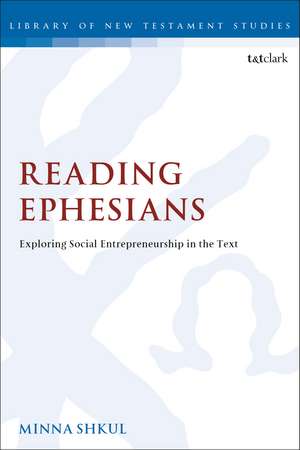Reading Ephesians: Exploring Social Entrepreneurship in the Text: The Library of New Testament Studies
Autor Dr Minna Shkulen Limba Engleză Paperback – 26 iun 2019
Minna Shkul examines how Ephesians engages in social entrepreneurship - the deliberate shaping of emerging Christian Identity through provision of ideological and social paradigms for the fledgling Christian community. Shkul uses social entrepreneurship as an umbrella for a variety of social processes reflected in the text. This eclectic theoretical framework and deutero-Pauline reading position has two key aims. The first is to offer a theoretically informed social-scientific reading which demonstrates the extensive socio-ideological shaping within the text, and displays the writer's negotiation of different group processes throughout the letter. The second is to examine emerging Christian identity in the text, testing its ideological and social contours and its reforms upon Jewish traditions. Crucially this is done without the theological presupposition that something was wrong with the Judaism practised at the time, but rather by focusing upon the divine 'legitimating' of the Christian group and its culture.
These readings of Ephesians examine how the writer engages in a self-enhancing discourse that reinforces basic components of communality. These include the construction of a positive in-group identity and the provision of ideological and social legitimating for the community. Shkul also discusses the textual reflection of communal relations in other groups in Greco-Roman antiquity. She examines how Christ-followers are positioned in a Jewish symbolic universe, which is forced to make room for Christ and his non-Israelite followers. Finally, she explores the attitude toward non-Israelites within Ephesians, and their need for re-socialization.
| Toate formatele și edițiile | Preț | Express |
|---|---|---|
| Paperback (1) | 232.17 lei 6-8 săpt. | +86.75 lei 7-13 zile |
| Bloomsbury Publishing – 26 iun 2019 | 232.17 lei 6-8 săpt. | +86.75 lei 7-13 zile |
| Hardback (1) | 892.73 lei 6-8 săpt. | |
| Bloomsbury Publishing – 9 dec 2009 | 892.73 lei 6-8 săpt. |
Din seria The Library of New Testament Studies
- 23%
 Preț: 191.31 lei
Preț: 191.31 lei - 22%
 Preț: 832.58 lei
Preț: 832.58 lei - 22%
 Preț: 832.09 lei
Preț: 832.09 lei - 22%
 Preț: 835.03 lei
Preț: 835.03 lei - 22%
 Preț: 832.65 lei
Preț: 832.65 lei - 30%
 Preț: 775.67 lei
Preț: 775.67 lei - 30%
 Preț: 510.04 lei
Preț: 510.04 lei -
 Preț: 173.21 lei
Preț: 173.21 lei - 31%
 Preț: 830.87 lei
Preț: 830.87 lei - 22%
 Preț: 834.60 lei
Preț: 834.60 lei - 22%
 Preț: 834.93 lei
Preț: 834.93 lei - 30%
 Preț: 717.05 lei
Preț: 717.05 lei - 30%
 Preț: 509.02 lei
Preț: 509.02 lei - 30%
 Preț: 1012.49 lei
Preț: 1012.49 lei - 14%
 Preț: 511.81 lei
Preț: 511.81 lei -
 Preț: 471.68 lei
Preț: 471.68 lei -
 Preț: 469.92 lei
Preț: 469.92 lei - 22%
 Preț: 832.99 lei
Preț: 832.99 lei -
 Preț: 414.71 lei
Preț: 414.71 lei - 22%
 Preț: 832.80 lei
Preț: 832.80 lei - 22%
 Preț: 831.76 lei
Preț: 831.76 lei - 22%
 Preț: 834.93 lei
Preț: 834.93 lei - 22%
 Preț: 831.59 lei
Preț: 831.59 lei - 22%
 Preț: 832.41 lei
Preț: 832.41 lei - 22%
 Preț: 832.99 lei
Preț: 832.99 lei -
 Preț: 98.92 lei
Preț: 98.92 lei - 30%
 Preț: 773.65 lei
Preț: 773.65 lei - 30%
 Preț: 656.90 lei
Preț: 656.90 lei - 22%
 Preț: 831.59 lei
Preț: 831.59 lei - 30%
 Preț: 509.52 lei
Preț: 509.52 lei - 23%
 Preț: 193.62 lei
Preț: 193.62 lei - 24%
 Preț: 190.33 lei
Preț: 190.33 lei - 30%
 Preț: 511.40 lei
Preț: 511.40 lei -
 Preț: 158.77 lei
Preț: 158.77 lei - 30%
 Preț: 509.52 lei
Preț: 509.52 lei - 30%
 Preț: 833.64 lei
Preț: 833.64 lei - 22%
 Preț: 834.93 lei
Preț: 834.93 lei - 31%
 Preț: 772.17 lei
Preț: 772.17 lei - 30%
 Preț: 774.20 lei
Preț: 774.20 lei - 14%
 Preț: 1124.92 lei
Preț: 1124.92 lei - 22%
 Preț: 948.51 lei
Preț: 948.51 lei - 14%
 Preț: 1128.84 lei
Preț: 1128.84 lei - 31%
 Preț: 1065.91 lei
Preț: 1065.91 lei - 22%
 Preț: 777.71 lei
Preț: 777.71 lei - 31%
 Preț: 1064.84 lei
Preț: 1064.84 lei - 22%
 Preț: 1063.44 lei
Preț: 1063.44 lei - 22%
 Preț: 889.49 lei
Preț: 889.49 lei - 22%
 Preț: 1006.06 lei
Preț: 1006.06 lei - 22%
 Preț: 890.20 lei
Preț: 890.20 lei - 14%
 Preț: 1009.55 lei
Preț: 1009.55 lei
Preț: 232.17 lei
Preț vechi: 297.79 lei
-22% Nou
Puncte Express: 348
Preț estimativ în valută:
44.46€ • 45.86$ • 36.85£
44.46€ • 45.86$ • 36.85£
Carte tipărită la comandă
Livrare economică 20 februarie-06 martie
Livrare express 16-22 ianuarie pentru 96.74 lei
Preluare comenzi: 021 569.72.76
Specificații
ISBN-13: 9780567689269
ISBN-10: 0567689263
Pagini: 304
Dimensiuni: 156 x 234 x 14 mm
Greutate: 0.41 kg
Editura: Bloomsbury Publishing
Colecția T&T Clark
Seria The Library of New Testament Studies
Locul publicării:London, United Kingdom
ISBN-10: 0567689263
Pagini: 304
Dimensiuni: 156 x 234 x 14 mm
Greutate: 0.41 kg
Editura: Bloomsbury Publishing
Colecția T&T Clark
Seria The Library of New Testament Studies
Locul publicării:London, United Kingdom
Caracteristici
"Cutting edge material." Loveday Alexander, University of Sheffield.
Cuprins
PART ONE: CONSTRUCTING IDENTITY
Chapter 1 - INTRODUCTION
PART TWO: LEGITIMATING IDENTITY
Chapter 2 - THEORETICAL FRAMEWORK FOR EXPLORING SOCIAL REMEMBERING AND COMMUNAL LEGITIMATION
Chapter 3 - READING EPHESIANS 2: REMEMBERING CHRIST & ITS COMMUNAL FUNCTIONS
Chapter 4 - READING EPHESIANS 3: REMEMBERING PAUL & COMMUNAL LEGITIMATION
PART THREE: POSITIONING IDENTITY
Chapter 5 - THEORETICAL FRAMEWORK FOR EXPLORING COMMUNAL SOCIAL ORIENTATION
Chapter 6 - READING EPHESIANS 4-6 PROTOTYPES AND ANTITYPES: PARADIGMS FOR SOCIAL ORIENTATION
Chapter 7 - CONCLUSIONS
Chapter 1 - INTRODUCTION
PART TWO: LEGITIMATING IDENTITY
Chapter 2 - THEORETICAL FRAMEWORK FOR EXPLORING SOCIAL REMEMBERING AND COMMUNAL LEGITIMATION
Chapter 3 - READING EPHESIANS 2: REMEMBERING CHRIST & ITS COMMUNAL FUNCTIONS
Chapter 4 - READING EPHESIANS 3: REMEMBERING PAUL & COMMUNAL LEGITIMATION
PART THREE: POSITIONING IDENTITY
Chapter 5 - THEORETICAL FRAMEWORK FOR EXPLORING COMMUNAL SOCIAL ORIENTATION
Chapter 6 - READING EPHESIANS 4-6 PROTOTYPES AND ANTITYPES: PARADIGMS FOR SOCIAL ORIENTATION
Chapter 7 - CONCLUSIONS
Recenzii
"A Helsinki-based researcher of early Jewish and Christian movements, Shkul presents a slightly revised version of her December 2007 Ph.D. dissertation at the University of Sheffield. She examines how the epistle deliberately shapes emerging Christianness by providing ideological and social paradigms for the community of Christ-followers. Part of that, she explains, is positioning the group in a Jewish symbolic universe, which is reconfigured to make room for Jesus Christ and his non-Israelite followers, and modelling the group after Israel as God's people. Among her topics are a theoretical framework for exploring social remembering and communal legitimation, the communal functions of remembering Christ, and a theoretical framework for exploring communal social orientation." -Eithne O'Leyne, BOOK NEWS, Inc.
"This volume examines how the letter to the Ephesians engages in social entrepreneurship, that is, the deliberate shaping of emerging Christianness by providing ideological and social paradigms for the community of Christ-followers. After a 42-page introduction, it develops a theoretical framework for exploring social remembering and communal legitimation, and presents readings of Ephesians 2 ('remembering Christ' and its communal functions) and Ephesians 3 (remembering Paul and communal legitimation). Then it provides a theoretical framework for exploring communal social orientation, and presents a reading of Ephesians 4-6 (prototypes and antitypes--paradigms for social orientation). Shkul concludes that Ephesians responded to its diverse cultural matrix by self-enhancing discourse and compelling imagination which invented traditions of Jesus' messiahship and non-Israelite election and led its readers to imagine blessedness and God's favor." -New Testament Abstracts, Vol. 54
Shkul's work is a fine example of the usefulness of social-scientific perspectives and tools for NT study.
Shkul's work provides an astute, although highly dense, look at Ephesians best suited for readers with a great deal of familiarity with social scientific theories as well as the particularities of Ephesians.
Mentioned in the Church Times
"This volume examines how the letter to the Ephesians engages in social entrepreneurship, that is, the deliberate shaping of emerging Christianness by providing ideological and social paradigms for the community of Christ-followers. After a 42-page introduction, it develops a theoretical framework for exploring social remembering and communal legitimation, and presents readings of Ephesians 2 ('remembering Christ' and its communal functions) and Ephesians 3 (remembering Paul and communal legitimation). Then it provides a theoretical framework for exploring communal social orientation, and presents a reading of Ephesians 4-6 (prototypes and antitypes--paradigms for social orientation). Shkul concludes that Ephesians responded to its diverse cultural matrix by self-enhancing discourse and compelling imagination which invented traditions of Jesus' messiahship and non-Israelite election and led its readers to imagine blessedness and God's favor." -New Testament Abstracts, Vol. 54
Shkul's work is a fine example of the usefulness of social-scientific perspectives and tools for NT study.
Shkul's work provides an astute, although highly dense, look at Ephesians best suited for readers with a great deal of familiarity with social scientific theories as well as the particularities of Ephesians.
Mentioned in the Church Times















